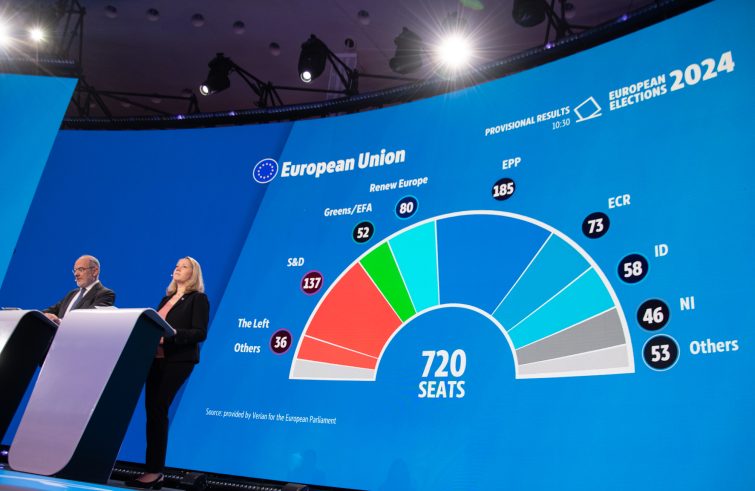
A number of elements are still missing in order to define the exact composition of the next European Parliament. It largely depends on the national vote-counting systems, with some uncertainties linked to the fact that MEPs elected at national level will have to decide which political group they actually want to join in the hemicycle. The EPP can count on 185 seats, the Socialists and Democrats on 137 and the Liberal Democrats on 79, according to the latest data published by the European Parliament’s bodies.
The former ‘Ursula majority’ would then have 401 seats out of 720
(361 votes are needed for the minimum limit), which the Greens’ 52 MEPs could join if the next majority and the European Commission show increased interest in the Green Deal.
The right-wing Conservatives and Identity and Democracy groups won 131 seats, with a further 100 seats still to be filled (‘independent’ and ‘other’ groups). The so-called pro-European ‘Ursula majority’ appears to be holding, according to the election results, despite the political success of the variously labelled sovereignist groups. Nevertheless, it will be necessary – in conjunction with the next President of the Commission – to redefine a common programme, to set political priorities in the light of the changed historical context, to envisage reforms aimed at improving the performance of the European Parliament and the European Union as a whole and, finally, to adopt strategic guidelines to address the major issues of the day, such as security and defence, climate change and the energy challenge, economic competition, research and innovation, migration, the digital revolution and the planned enlargement to the Balkans, Ukraine, Moldova and Georgia.
After the elections, Ursula Von der Leyen appears to be closer to a second mandate as the helm of the EU Commission (although her appointment is subject firstly to the consensus of the European Council, which brings together the 27 heads of state and government, and then to a vote of approval by the Eurochamber). The strong presence of nationalist groups in the EU Parliament, whose representatives account for a significant proportion of European voters, will also be a challenge.
Finally, the European Parliament’s vote affects nation states and domestic political majorities and minorities.
France has announced snap elections at the end of June following a massive defeat for Macron’s Renaissance party and sweeping gains for the Lepenists. Germany’s Scholz government received a major blow, while Belgium’s Premier De Croo has resigned. The political landscape is changing in Poland, Spain, Austria and even Hungary.
The case of Italy is different. In fact, the Prime Minister’s Fratelli d’Italia party won a decisive victory in the European elections, Forza Italia did well and the Lega party achieved a moderate consensus, giving the government additional stability. The main opposition party, the Democratic Party (PD), has gained more votes, while the 5-Star Movement fell sharply. The AVS (Alliance of the Greens and the Left) performed well, while the formations led by Renzi and Calenda failed to reach the 4% electoral threshold.









